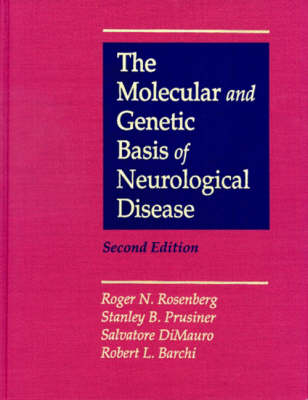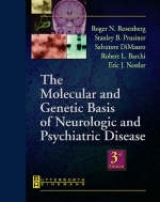
The Molecular and Genetic Basis of Neurological Disease
Butterworth-Heinemann Ltd (Verlag)
978-0-7506-9668-5 (ISBN)
- Titel erscheint in neuer Auflage
- Artikel merken
Determination of the molecular pathogenesis of genetic neurological disease is indispensable to the development of pharmacologic or gene therapy for these disorders. Therapy for patients is the ultimate goal, and as described in the text such progress is just beginning in several areas such as glycogen storage disease, lipoprotein disorders, lysosomal disorders, Duchenne muscular dystrophy, genetic forms of epilepsy and membrane excitability disorders among others.
Roger N. Rosenberg, MD is a graduate of Northwestern University Medical School, With Distinction, and was subsequently trained in Neurology with H. Houston Merritt, MD at the Neurological Institute, Columbia University, New York, was Chief Resident and then was a Post-Doctoral Fellow with Nobel Laureate Marshall Nirenberg at the NIH in the Laboratory of Biochemical Genetics. He is Board Certified by the American Board of Psychiatry and Neurology. He is holder of the Zale Distinguished Chair and Professor of Neurology and Neurotherapeutics at the University of Texas Southwestern Medical Center at Dallas since 1973 and developed the department for 18 years as Chair from 1973-1991. He described for the first time in 1975 Machado Joseph disease, an autosomal dominant cerebellar degeneration, which produces imbalance and impaired coordination, and showed it was due to a unique expansion of DNA in the causal gene. It is the most common inherited form of impaired coordination in the world and his research has provided a genetic marker to eliminate it in large families in future generations. He has served as the Founding Director of the UT Southwestern NIH funded Alzheimer's Disease Center and Principal Investigator of the NIH Center Grant from 1987-2019. He directs an active laboratory effort in Alzheimer's Disease. He is developing a DNA Ass42 trimer vaccine for Alzheimer's disease for which he was awarded a US Patent Amyloid Beta Gene Vaccines in January 2009. It has been tested in mouse, transgenic mouse, New Zealand white rabbits and rhesus monkeys. The vaccine produces effective anti-Ass42 peptide antibody levels and is non-inflammatory in all three species. The vaccine reduces by 40% Ass42 peptide and by 50% tau and phospho-tau in the brains of 3X AD Tg mice, the two main pathologies of Alzheimer's disease, with high levels of anti-Ass42 antibody and with a non-inflammatory immune response. He is preparing now a Phase 1 Clinical trial Grant - First in Human to determine its effectiveness and safety in human subjects. He has published 297 original scientific articles, chapters, reviews, and editorials. He served as Editor in Chief from 1997 through 2017 for JAMA Neurology (formerly Archives of Neurology), a major international neurology journal, published by the American Medical Association. During his tenure, he raised the Impact Factor of the journal from 3.0 to 10.2, placing JAMA Neurology as #1 of all US publications in neurology. He is the founding editor of two of the landmark texts in neuroscience. Rosenberg's Molecular and Genetic Basis of Neurological and Psychiatric Disease, 5th edition, published in 2015 by Elsevier. The 6th edition will publish in 2020. The Atlas of Clinical Neurology, 4th edition, has just been published. He is a former President of the American Academy of Neurology, former Vice-President of the American Neurological Association, an Honorary Member of both organizations, and a Fellow of the American Association for the Advancement of Science. He received the first Science Medal in 2009 from the World Federation of Neurology for his contributions to neuro-genetics, for his original clinical and molecular genetics research on Machado-Joseph disease, and the development of the DNA Abeta42 trimer vaccine for Alzheimer's disease.
Contents: 1. Molecular Genetics and Neurologic Disease: An Introduction; 2. A Neurologic Gene Map; 3. Finding and Excluding Gene Locations by Linkage Analysis; 4. Gene Targeting; 5. Down Syndrome; 6. Fragile X Syndrome; 7. Molecular Biology of Prion Diseases; 8. Clinical and Neuropathologic Features of Prion Diseases; 9. Inherited Prion Diseases; 10. The Mitochondrial Genome; 11. Mitochondrial Encephalomyelopathies; 12. Mitochondrial Mechanisms of Aging; 13. Peroxisomal Disorders; 14. Refsum Disease; 15. The Mucopolysaccharidoses and the Mucolipidoses; 16. Disorders of Glycoprotein Degradation; 17. Wolman Disease; 18. Ceramidase Deficiency: Farber Lipogranulomatoses; 19. The Niemann-Pick Disease Group; 20. Glucosyceramide Lipidosis: Gaucher Disease; 21. Krabbe Disease (Globoid Cell Leukodystrophy); 22. Metachromatic Leukodystrophy and Multiple Sulfatase Deficiency; 23. Fabry Disease: Alpha-Galactosidase A Deficiency; 24. Schindler Disease: Deficient Alpha-N-Acetylgalactosamindase Activity; 25. Beta-Galactosidase Deficiency: GM1 Gangliosidosis, Morquio B Disease, and Galactosialidosis; 26. The GM2 Gangliosidoses; 27. Canavan Disease; 28. The Hereditary Ataxias; 29. Huntington Disease; 30. Inherited Disorders of the Basal Ganglia; 31. Alzheimer Disease: Clinical and Genetic Features; 32. Cellular and Molecular Biology of Amyloid and Alzheimer Disease; 33. Cellular and Molecular Biological Aspects of Tau and Alzheimer Disease; 34. Inherited Multiple Sclerosis; 35. Oncogenes and Neuro-Oncology; 36. Tumors of Neuronal Cell Origin; 37. Tumor Suppressor Genes and the Nervous System; 38. The Clinical and Molecular Genetics of Neurofibromitosis I and II; 39. Myotonia Congenita; 40. The Periodic Paralyses; 41. Malignant Hyperthermia and Central Core Disease; 42. Episodic Ataxia and Myokymia; 43. Genetic Epilepsies; 44. Spinal Muscular Atrophy; 45. Inherited ALS; 46. Inherited Demyelinating Neuropathy; 47. Inherited Axonal Neuropathy; 48. Familial Amyloidotic Neuropathy; 49. Congenital Myopathies; 50. Dystrophinopathi
| Zusatzinfo | Illustrations, 1 port. |
|---|---|
| Verlagsort | London |
| Sprache | englisch |
| Gewicht | 4365 g |
| Themenwelt | Medizin / Pharmazie ► Medizinische Fachgebiete ► Neurologie |
| Naturwissenschaften ► Biologie ► Genetik / Molekularbiologie | |
| Naturwissenschaften ► Biologie ► Zellbiologie | |
| ISBN-10 | 0-7506-9668-0 / 0750696680 |
| ISBN-13 | 978-0-7506-9668-5 / 9780750696685 |
| Zustand | Neuware |
| Haben Sie eine Frage zum Produkt? |
aus dem Bereich



